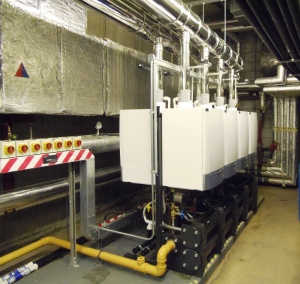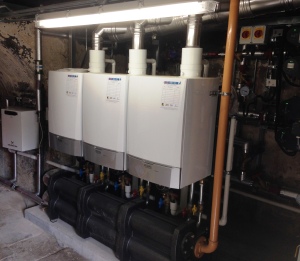Making the gas go further

With gas looking to be an even more important fuel for generating electricity, James Porter of Remeha Commercial, examines the role of the condensing boiler in making the UK’s gas supplies go further.
Scared of the dark? If the thought of the lights going out across the UK makes you nervous, one option is to make sure you have stocked up on candles and torches by 11 January [if that date hasn’t already passed by the time you read this article]. This data, according to the National Grid, is when the gap between Britain’s energy needs and supply is at its very thinnest.
Or, if you want to effect real change, actively avoid wasting energy in the first place. For whilst as we look to generate energy from renewable sources, it is equally important we reduce our energy usage wherever possible.
Heating, which is accountable for almost half of a building’s total energy consumption, offers huge potential for efficiency savings.
And when it comes to the UK’s large proportion of energy-inefficient buildings, high-efficiency condensing boilers top the list of practical, cost-effective retrofit solutions for immediate, substantial energy and carbon savings.
 |
| Installing seven Quinta Pro 115kW condensing boilers in cascade configuration in the pool side plant room at Aspire Leisure Centre in Stanmore overcame the issue of restricted space whilst effectively meeting the heat-output demand and improving reliability. |
Improving our energy efficiency is pivotal to achieving a more sustainable future. Some 80% of UK properties currently depend on gas for heating, with commercial boiler plant providing the heating for a significant percentage of our non-domestic buildings. If the boilers are inefficient, that’s a huge unnecessary waste of energy and finances. The Carbon Trust estimates that organisations stand to achieve energy and carbon savings in the region of 30% simply by replacing inefficient boilers with high-efficiency condensing boilers. This is a conservative estimate; our own data points to savings as high as 50%, depending on the building and its existing heating system. With their ultra-low NOx emissions, condensing boilers can also help create cleaner air, reducing allergies and respiratory conditions and improving health and well-being — all of which produces a more comfortable and productive working environment.
Condensing boilers are capable of achieving 10 to 12% higher efficiencies than non-condensing boilers due to their ability to recover both the sensible and latent heat from the flue gases, energy which is otherwise wasted by conventional boilers. Condensing boilers installed in a well-designed system allow us to use energy more effectively and more efficiently. On a national level, this helps us protect our energy security. For individual businesses and organisations, the relatively low initial investment of condensing boilers combined with lower gas prices offers a fast track to more affordable energy costs.
Smart system design is, of course, crucial to achieving the higher efficiencies. For continuous condensing to take place, the boiler return water must be at or below the dew point of the flue gases — around 54°C. On older heating systems sized on higher flow and return temperatures (typically 82/71°C), design where possible to promote lower return temperatures or add the appropriate weather compensated controls to maximise continuous condensing and ensure efficient use of the energy input.
Alternatively, perhaps the simplest means of achieving continuous condensing on older heating systems is to install a full-time condensing boiler incorporating passive flue gas heat recovery technology to recover any waste energy and preheat cold water via a plate heat exchanger. Such a full-time condensing boilers can operate at 100% efficiency regardless of flow and return temperatures or boiler load.
 |
| Three Quinta Pro 90 kW condensing boilers in a cascade system with low-loss header provided numerous different installation options to overcome the irregular features of historic Hexham Abbey, whilst ensuring that the maintenance requirements of the unit were achieved. |
Consider also installing multiple boilers in cascade operation and adding a sequential control. Operating multiple boilers in sequence facilitates wider output modulation, allowing the boilers to match more accurately the heat demand of the building. The boilers therefore operate more efficiently and for longer, resulting in maintenance and operational cost savings.
Plant rooms come in all shapes and sizes, and their irregular features can present a challenge when it comes to system design — which can also have an impact on the budget. Well-designed cascade systems offer contractors a number of design installation options to accommodate these restrictions.
A more recent innovation is the bespoke rig system service introduced by some manufacturers to help consultants overcome plant-room limitations and tight deadlines. These rigs are designed and manufactured to meet the exact requirements of each project so that they can be installed in a fraction of the time. This solution is particularly beneficial for organisations restricted to a small window of time in which to carry out refurbishment projects.
Whether condensing boilers are the sole provider of heat or installed alongside renewable energy technologies such as gas absorption heat pumps and combined heat and power (CHP) units, they offer a practical, affordable, flexible solution to cleaner, energy-efficient heating today and tomorrow.
The Government has identified gas as an important source in our future energy mix. Condensing technology allows us to use this clean-burning fuel more effectively and sparingly to achieve lower greenhouse gas emissions, significant energy and cost savings, and improved energy security.
James Porter is national sales manager with Remeha Commercial.







